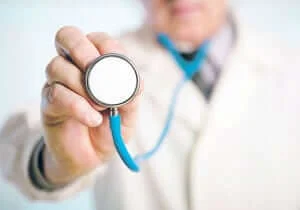Some men outright refuse to discuss it or admit that it is a problem, even when it is affecting themselves or the happiness of their partner. However, it is imperative that those who are afflicted with it understand that it is a common and treatable health problem that can be an indicator of more serious health issues. Difficulty keeping
Erectile Dysfunction: Meaning, Definition and Causes
It is clear that erectile dysfunction is far from a hopeless condition and seeking treatment for it need not be a source of embarrassment.
Some men outright refuse to discuss it or admit that it is a problem, even when it is affecting themselves or the happiness of their partner. However, it is imperative that those who are afflicted with it understand that it is a common and treatable health problem that can be an indicator of more serious health issues. Difficulty keeping erect can experience all males: young boys and men aged. In younger age erection problems can arise due to unformed genitourinary system, failure to begin or finish sexual intercourse in adulthood indicate health problems. Ignoring the problem will not make it go away, and while it may be initially embarrassing to admit that the problem exists seeking medical help for it is deeply important not only to sexual satisfaction but also to overall health. To begin treatment you must be familiar with basic medical terms of urology.

What Is Erectile Dysfunction?
Erectile dysfunction is characterized by a difficulty or inability to achieve or maintain an erection of sufficient firmness or duration to perform during sexual intercourse. This can manifest prior to sexual relations or during the process, resulting in interruptions to intimacy and personal embarrassment. Changes also occur with morning erection. The awakening is accompanied by either a soft erection or its absence. To understand the dysfunction involved it is important to know what normal function is, and while this may vary from man to man there is certain baseline qualification for what constitutes normal sexual function.
Normal Sexual Function

This rigidity will be of sufficient duration to achieve an enjoyable experience for both the man and his partner and end in orgasm, after which the rigidity will subside and the penis will again attain a flaccid state. If there is any variation of this, ranging from a delay in achieving an erection to an inability to enjoy the experience or achieve orgasm, then erectile dysfunction is a possibility.
Remember: after the first difficulties in the sexual act there is no need to run to the doctor. Perhaps you had a hard day or not the most romantic mood. People can not always want to have sex. Things that cause reluctance have any man, so don’t despair. If the trouble happens with noticeable frequency and you and your partner ceased to receive pleasure from sex – it is a reason to go to the doctor.
Which Symptoms Has This Disease?
Erectile dysfunction, or ED, can come in many forms. Many who suffer from it are unable to achieve a boner at all, while others are able to do so but unable to maintain it for a sufficient amount of time. Others are able to have an erection but without enough firmness to aid in penetration. Some are able to perform but report an inability to enjoy the experience because of insufficient rigidity and low sensitivity. Many variations of symptoms united by main key indicator – inability to have sex, despite the desire for intimacy. If any of these symptoms are present they may be indicative of ED and require medical treatment to alleviate.
Differences Between ED and Impotence
Impotence and ED are often conflated but are not necessarily the same thing. ED represents a continuum of sexual difficulties that are treatable whereas traditionally impotence has been seen as a hopeless, permanent condition brought on by age or weakness. It is also connected with infertility and lack of motility of sperm that would create difficulty in procreation. It is a term that has fallen out of favor with medical professionals as science has advanced, better understanding ED and how to treat its symptoms.
Weak Erection – It Is ED or Not?

How Many Men Have It?
Statistically speaking, men are at a high risk of suffering from ED at some point in their lives. It chronically affects as many as 30 million American men, including up to 50 percent of men between the ages of 40 and 70. Generally speaking, men are at a higher risk of ED as they get older but a variety of health issues can contribute to men suffering from it below age 30.
Erectile Dysfunction Causes
There are many factors that can lead to erectile dysfunction, as well as many correlating factors which will not necessarily be a cause. This makes the diagnosis and treatment of ED a sensitive process. Some common causal factors about why does erectile dysfunction happen:
- psychological causes, such as problems within a relationship;
- physical problems, such as enlarged prostate or circulatory system problems;
- heart disease;
- smoking, drinking alcohol or substance abuse;
- chronic depression or anxiety;
- high cholesterol;
- low testosterone;
- diabetes;
- obesity;
- nervous system diseases such as Multiple Sclerosis;
- side effects of certain prescription medications.
While far from an exhaustive list, it is clear that there are many possible causes for ED and finding the one that applies can be a difficult process.
Most Common

Ibuprofen and Aspirin
Two of the most common pain relievers on the market have been linked to erectile dysfunction. Known as NSAIDs (nonsteroidal anti-inflammatory drugs)are often considered safe for daily use but if you are struggling with ED symptoms your doctor may consider changing your pain relieving method to a different prescription medication.
High Cholesterol
There is a correlation between ED and high cholesterol, which is why changes to diet and exercise is one of the first treatments that are prescribed before others are attempted. If high cholesterol is a known health issue medication for the remedy of this condition may also be prescribed to treat ED in an ancillary manner.
Does ED Depend on the Age?
Percentage of men suffering from ED by age group:
| Age | Percentage |
| 20-29 | 8% |
| 30-39 | 12% |
| 40-49 | 39% |
| 50-59 | 48% |
| 60-69 | 57% |
| 70-79 | 67% |
What Kind of Doctor Treats ED?

How to Talk to Your Doctor About ED
While it can be embarrassing to talk to anyone about sexual health, if there are symptoms of ED it is important that they are discussed with a physician. Not only is sex an important dimension of health but symptoms of ED can be a bell weather for other health problems. When speaking with your doctor, be prepared to discuss your sexual history openly and honestly. Things that your doctor will need to know include the following:
- frequency of symptoms and how long they have been experienced;
- circumstances surrounding the symptoms, such as what time of the day they occur or with which;
- partner;
- all cures and herbal supplements you are taking;
- diet and exercise habits;
- frequency of smoking or drinking;
- other symptoms that you are experiencing, such as anxiety or depression.
Some of what will be discussed will be extremely personal and may be uncomfortable. However, it is important to do so as openly and honestly as possible. It may be helpful to have your partner speak to the doctor as well as they may have a perspective that will aid in diagnosis or in isolating specific problems surrounding symptoms of ED.
What To Expect at the Doctor’s Office
Advice: before going to the doctor try to mentally tune. You need to understand that the situation will not get well automatically and staying in one place does not lead to anything good. Just tell yourself – I have to be healthy. Drop the shame and go to the office.
Not only should you expect to discuss your sex life with your physician but you should be prepared to undergo a thorough physical examination. This may include an examination of the penis and testicles as well as a prostate exam. You may expect closer scrutiny of hair loss and breast enlargement as they can indicate that there may be an imbalance of hormones.

Blood work and urine testing may uncover underlying health problems, but an ultrasound or may be called for in order to test the viability of erectile function.
In addition, the doctor will measure your blood pressure, examine the heart. Often erectile dysfunction is related to cardiac problems. If the doctor finds related disease, you have to ask for double the therapy. For example, it can be lisinopril for the treatment of heart, and Viagra for the salvation of sex life. It is forbidden to self-medicate. Improper dosage and combination of drugs can even lead to death.
Ultrasounds and Intracavernosal Injections
If your doctor orders an ultrasound or an intracavernosal injection it could be that they have cause for concern about blood flow to the penis. The injection can be discomfiting, as it is injected directly into the base of the penis, but it is one of the most reliable ways of testing the viability of erectile function and can determine the best erectile dysfunction treatment and plan going forward.
Mental Health Exams
If it is apparent that physical factors are not the cause of erectile dysfunction, your doctor may prescribe examination by a mental health professional with a background in sexual health. This may entail covering areas that you have already covered with your physician and urologist previously, but it should be approached with as much candor as possible. Mental conditions may be a contributing factor to the symptoms or it may become clear that there is a serious problem with the relationship with your partner. In either case, treatment of the condition is essential to achieving a healthier and happier sex life.
Counseling and Psychological Treatment
Regular counseling (either personal or in concert with your partner) may be prescribed by your doctor. The purpose of this course of treatment will be to explore and navigate personal issues which may be contributing to sexual difficulties. This could include exploring past traumas experienced by yourself or your partner as well as barriers to intimacy that you are experiencing. While this can be a difficult and lengthy process, commitment to doing the work can yield significant progress and result in dramatically improved sexual health.
Is There a Natural Way to Prevent ED?

However, it is not necessarily a surefire solution as many otherwise healthy and fit men struggle with symptoms of ED. It is a good idea to incorporate an improvement of overall health into a treatment plan so long as it is clear that other treatments may be necessary if symptoms persist.
Medications for Erectile Dysfunction
Treatment of erectile dysfunction has come a long way and many treatments are at your doctor’s disposal and may be included in your treatment plan. One common treatment is oral medication meant to stimulate erectile function by improving blood flow.
There are several brands on the market but they may or may not be right for you based upon your general health or other medications you are taking. Each has a different onset time and duration so discussing which one may be right for you with your doctor is imperative before trying any oral medication. In some cases, a suppository or injection directly into the penis may also be prescribed to treat the condition, but this is typically only in severe cases as it can result in permanent damage if used improperly.
Alternative Treatments for Erectile Dysfunction
There are many reasons why pharmaceutical treatment may not be a viable option for you. If you have allergic reactions to certain drugs or are taking other prescriptions which have interaction warnings with commonly prescribed erectile function enhancers it may behove you to pursue alternative treatment options.

- herbal or natural Viagra and other remedies;
- massage therapy;
- hormone therapy;
- vitamin supplements;
- acupuncture.
These options should still be pursued under the care of your physician as they will have access to reliable data pertaining to the effectiveness of these treatments. Some supplements and procedures may be of dubious value and may not be approved by the FDA, so proceed carefully when pursuing this course of treatment.
Mechanical Aids
If other forms of treatment are not effective in the treatment of erectile dysfunction your doctor may prescribe the aid of a specific device in an effort to stimulate and maintain an erection. One such procedure involves the use of a penis pump, or vacuum erection device, prior to having sex. The vacuum that the handheld device creates is meant to draw blood to the penis, after which a tension band is applied to keep the erection for a sufficient interval to complete intercourse. However, this has been known to cause pain and bruising and may not be a viable long-term solution.
Surgical Treatments
Surgery may be prescribed as a last-ditch effort to restore erectile function. There are two common procedures that are devised to accomplish this; penile implants and blood vessel surgery. A penile implant places prosthetic devices into the penis connected to a device that inflates them when you are ready to have sex. Semi-rigid rods are also used to create a firm yet flexible penis. Such implants are not a primary option because of the invasive nature of the procedure and because of potential complications such as infection. Blood vessel surgery is another surgical option that bypasses obstructed arteries to improve blood flow to the penis but is only recommended for men who suffer from that specific problem.
Are You Healthy Enough for Sex?

Do not hesitate to discuss this with your doctor when pursuing treatment options and always be aware of hazards caused by treatments that may restore sexual function but not take into consideration other conditions that may be risk factors. Proceed steadily, but with caution.
Conclusion
It is clear that erectile dysfunction is far from a hopeless condition and seeking treatment for it need not be a source of fear. You don’t have to live with constant embarrassment for yours erectile dysfunction. It is much more common in men than is reported and doctors are not only accustomed to treating it but have a wide variety of options available when it comes to treatment for ED.
No matter if the symptoms are new or have persisted for years, occur frequently or infrequently, your doctor is capable of addressing your concerns and treating the condition with an appropriate method that will fit your medical profile.
Do not forget to order our free ED trial pack which includes free Viagra samples, free Cialis samples, and free Viagra Soft samples.

 Free Viagra Samples 10 x 100mg
Free Viagra Samples 10 x 100mg Free Levitra Samples 10 x 20mg
Free Levitra Samples 10 x 20mg Free Cialis Samples 10 x 20mg Online
Free Cialis Samples 10 x 20mg Online